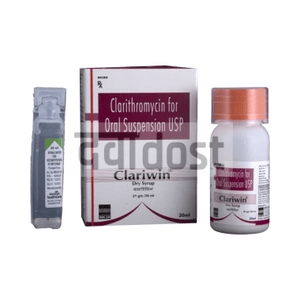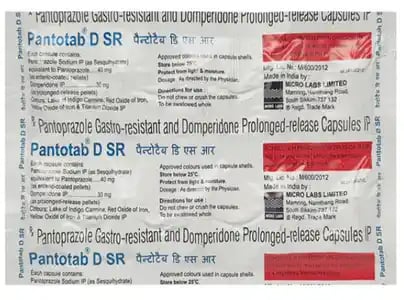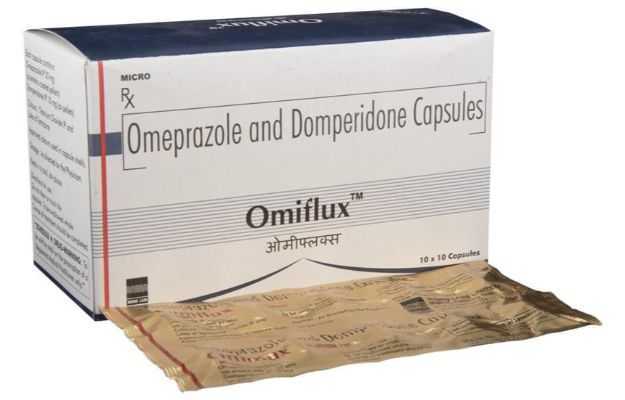clariwin CLARITHROMYCIN
Introduction to Clariwin
Clariwin is a potent antibiotic medication primarily used to treat various bacterial infections. It belongs to the macrolide class of antibiotics, which are known for their effectiveness in inhibiting the growth of bacteria by interfering with their protein synthesis. Clariwin is commonly prescribed for respiratory tract infections, skin infections, and certain types of stomach ulcers caused by bacteria. It is available in multiple forms, including tablets, capsules, and oral suspension, making it versatile and convenient for different patient needs.
Composition of Clariwin
The active ingredient in Clariwin is Clarithromycin, which is present in a dosage of 500mg. Clarithromycin works by binding to the 50S ribosomal subunit of the bacteria, thereby inhibiting protein synthesis and preventing the growth and multiplication of bacteria. This action makes Clariwin effective against a wide range of bacterial pathogens, ensuring that infections are treated efficiently and effectively.
Uses for Clariwin
- Treatment of respiratory tract infections such as pneumonia and bronchitis.
- Management of skin infections like cellulitis and impetigo.
- Eradication of Helicobacter pylori in combination with other medications to treat stomach ulcers.
- Treatment of ear infections, such as otitis media.
- Prevention and treatment of Mycobacterium avium complex (MAC) infections in patients with HIV.
Side Effects of Clariwin
- Nausea and vomiting
- Diarrhea
- Abdominal pain
- Headache
- Altered taste sensation
- Liver function disturbances
- Allergic reactions such as rash or itching
Precautions for Clariwin
Before taking Clariwin, it is important to inform your healthcare provider about any allergies you may have, especially to antibiotics. Patients with liver or kidney problems should use Clariwin with caution, as dosage adjustments may be necessary. It is also crucial to complete the full course of the medication, even if symptoms improve, to prevent the development of antibiotic-resistant bacteria. Pregnant or breastfeeding women should consult their doctor before using Clariwin. Avoid consuming alcohol during the treatment period to prevent adverse interactions.
Specifications of Clariwin
Clariwin is available in various forms to suit different patient preferences and needs:
- Tablets: Clariwin tablets contain 500mg of Clarithromycin and are typically taken orally, with or without food.
- Capsules: Similar to tablets, Clariwin capsules also contain 500mg of Clarithromycin and provide an alternative for those who prefer capsules over tablets.
- Oral Suspension: The oral suspension form is suitable for children or adults who have difficulty swallowing pills. It is important to shake the bottle well before each use to ensure proper dosage.
Conclusion
Clariwin, with its active ingredient Clarithromycin, is a versatile and effective antibiotic used to treat a variety of bacterial infections. Available in tablets, capsules, and oral suspension, it offers flexibility in administration. While generally well-tolerated, it is important to be aware of potential side effects and take necessary precautions. Always follow your healthcare provider's instructions and complete the full course of treatment for the best outcome. Clariwin remains a reliable choice for combating bacterial infections, ensuring patients can return to health swiftly and safely.


Can Clariwin be taken safely while breastfeeding?
Clariwin is excreted into breast milk, and its effects on a breastfed infant are not well-known. It may cause side effects in the infant, such as diarrhea or rash. If you're breastfeeding, discuss with your doctor whether to continue the medication or consider alternative treatments. Your doctor can help you weigh the benefits and risks.

Can Clariwin be taken safely while pregnant?
The safety of Clariwin during pregnancy is not well-established. It should only be used if the benefits outweigh the risks. Animal studies have shown some risks, but human data is limited. If you're pregnant or planning to become pregnant, talk with your doctor about the safest treatment options for your condition.

Can I take Clariwin with other prescription drugs?
Clariwin can interact with several medications, increasing the risk of side effects or reducing effectiveness. Major interactions include drugs like warfarin, which is a blood thinner, and certain statins, which are used to lower cholesterol. These interactions can increase the risk of bleeding or muscle problems. Always inform your doctor about all medications you're taking to avoid potential interactions.

Does Clariwin affect appetite?
Clariwin doesn't typically affect appetite. Most people take this medication without noticing changes in how hungry they feel. If you notice unexpected changes in your appetite after starting Clariwin, talk with your doctor. They can help determine if these changes are related to the medication or if another cause is involved.

Does Clariwin affect mood?
Clariwin doesn't typically cause mood changes or mental health effects. Most people take this medication without experiencing anxiety or agitation. If you notice changes in your mood after starting Clariwin, talk with your doctor. These symptoms might be related to another cause, and your doctor can help determine the best course of action.

Does Clariwin affect sleep?
Clariwin doesn't typically cause sleep problems. Most people take this medication without experiencing changes in their sleep patterns. If you notice changes in how well you sleep after starting this medication, talk with your doctor. Sleep problems might be related to another cause, and your doctor can help determine the best course of action.

Does Clariwin cause headaches?
Headaches can occur as a side effect of Clariwin, but they are not very common. If you experience mild headaches, staying hydrated and resting may help. Over-the-counter pain relievers can also be used after consulting your doctor. If headaches are severe or persistent, contact your healthcare provider to determine if they are related to the medication.

Does Clariwin cause stomach upset?
Clariwin can cause stomach upset, including nausea, vomiting, and diarrhea. These side effects are usually mild and may go away on their own. Taking the medication with food might help reduce discomfort. If you experience severe or persistent stomach issues, contact your doctor. They can help determine if these symptoms are related to Clariwin or if another cause is involved.

Does Clariwin cause weight gain?
Clariwin doesn't typically affect body weight. Most people take this medication without noticing changes in their weight. If you experience unexpected weight changes while taking Clariwin, talk with your doctor. They can help determine if these changes are related to the medication or if another cause is involved.

Does Clariwin interfere with sexual function?
Clariwin doesn't typically cause sexual side effects like erectile dysfunction or loss of libido. Most people take this medication without noticing changes in their sexual function. If you experience any persistent discomfort or changes in your sexual function while taking Clariwin, talk with your doctor. Your doctor can help determine if your symptoms are related to the medication and recommend appropriate treatment to address any issues.

Does Clariwin limit driving?
Clariwin might cause dizziness or drowsiness, which can impair your ability to drive safely. If you feel dizzy or lightheaded after taking Clariwin, avoid driving until these symptoms go away. Pay attention to how your body responds when you first start the medication. Talk with your doctor if you have concerns about driving while taking this medication.

Does Clariwin make it hard to think or concentrate?
Clariwin doesn't typically cause cognitive issues like difficulty concentrating or thinking. Most people take this medication without experiencing changes in mental focus. If you notice problems with your thinking after starting Clariwin, talk with your doctor. These symptoms might be related to another cause, and your doctor can help determine the best course of action.

Does Clariwin make people tired or drowsy?
Clariwin can cause fatigue or drowsiness in some people, but these side effects are not common. If you notice you're feeling unusually tired while taking Clariwin, talk with your doctor. Your tiredness might be caused by something else, like another medication or an underlying health condition. Your doctor can help determine the cause and recommend appropriate adjustments.

For how long do I take Clariwin?
Clariwin is usually prescribed for short-term use to treat acute infections. The duration of use depends on the type and severity of the infection. Typically, it's taken for 7 to 14 days. Always follow your doctor's instructions and complete the full course, even if you feel better, to ensure the infection is fully treated.

How does Clariwin work?
Clariwin works by inhibiting the growth of bacteria. It does this by binding to the bacterial ribosome, which is a part of the cell that makes proteins. By blocking protein synthesis, Clariwin prevents bacteria from growing and multiplying. This helps your body's immune system fight off the infection. It's effective against a wide range of bacteria, making it useful for treating various infections.

How do I know if Clariwin is working?
Clariwin is used to treat bacterial infections. You'll know it's working when your symptoms, like fever or pain, improve. Your doctor may also monitor your progress with tests or check-ups. If your symptoms don't improve or worsen, contact your doctor. They can adjust your treatment if needed.

How do I take Clariwin?
Take Clariwin exactly as prescribed by your doctor. It's usually taken twice daily, with or without food. Swallow the tablets whole; do not crush or chew them. If you miss a dose, take it as soon as you remember unless it's almost time for your next dose. In that case, skip the missed dose and continue your regular schedule. Do not take two doses at once. Always follow your doctor's specific instructions.

How long does it take for Clariwin to start working?
Clariwin starts working soon after you take it, but you may not notice improvement in symptoms right away. It usually takes a few days to see significant improvement. The full therapeutic effect may take a week or more, depending on the infection. Factors like the type of infection and your overall health can affect how quickly you notice results. Always take it as prescribed for the best outcome.

How should I store Clariwin?
Store Clariwin at room temperature, away from moisture and light. Keep it in a tightly closed container. Do not store it in the bathroom, where humidity can affect the medication. Always keep it out of reach of children to prevent accidental ingestion. Check the expiration date regularly and dispose of any unused or expired medication properly.

Is Clariwin effective?
Clariwin is effective in treating various bacterial infections, such as respiratory tract infections and skin infections. It works by stopping the growth of bacteria. Clinical studies support its effectiveness in improving symptoms and clearing infections. Always take it as prescribed by your doctor to ensure the best results.

Is Clariwin safe for the elderly?
Elderly individuals may be more vulnerable to side effects of Clariwin, such as liver problems or heart rhythm changes. It's important for older adults to be closely monitored by their doctor while taking this medication. Dose adjustments may be necessary based on their overall health and kidney function. Always follow your doctor's advice and report any unusual symptoms.

What are Clariwin possible harms and risks?
The most common side effects are stomach pain, diarrhea, nausea, vomiting, and a bad taste in the mouth. Other side effects include indigestion, abnormal liver function tests, allergic reactions, yeast infections, headaches, trouble sleeping, and rash. Serious side effects include severe allergic reactions, heart rhythm problems, liver damage, and worsening of myasthenia gravis (a muscle weakness disorder). In one study, 3.5% of patients stopped taking the drug due to side effects. Liver problems, which can be serious but usually go away, have been reported. In rare cases, liver failure has been linked to other health conditions or medications.

What disease or symptom is Clariwin used for?
Clariwin is used to treat bacterial infections such as respiratory tract infections, skin infections, and certain types of stomach ulcers caused by Helicobacter pylori. It works by stopping the growth of bacteria. Clariwin can be used alone or with other medications, depending on the infection. It's important to take it as prescribed to effectively treat the infection.

What is Clariwin?
Clariwin is an antibiotic used to treat various bacterial infections, such as respiratory tract infections and skin infections. It belongs to the macrolide class of antibiotics, which work by stopping the growth of bacteria. Clariwin is often used when other antibiotics are not suitable or effective. It can be used alone or in combination with other medications to treat specific infections.

Who should avoid taking Clariwin?
Do not take Clariwin if you're allergic to it or its ingredients. It is contraindicated in people with a history of liver problems related to its use. Clariwin should be used with caution in people with heart rhythm disorders. Always inform your doctor about your medical history and any other medications you are taking to avoid potential risks.
Available in 4 variations

Clariwin 125mg Tablet DT
strip of 10 tablet dt

strip of 10 tablets

strip of 10 tablets

bottle of 30 ml Oral Suspension














.svg)
